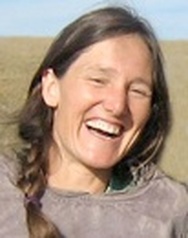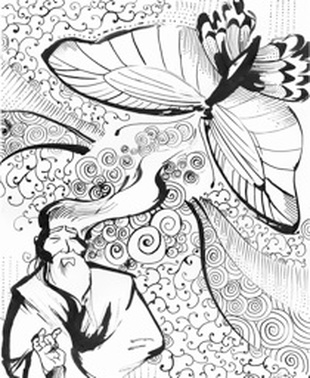Free and Footloose Roaming: Understanding Chinese Medicine through Zhuangzi with Sabine Wilms, Ph.D.3/15/2014
 March 15, 2014 ~ 9 AM-6PM 8 CEU's Course description: Composed in the third century BCE, the Zhuangzi is not only one of the most beautiful, thought-provoking, and entertaining writings from classical China but also the most relevant Daoist classic for practitioners of Chinese medicine. It discusses topics like life and death; the nature of the universe and the role of humans therein; true health and happiness; the self, the limitations of rational thinking, and the acquisition of technical skills; and perhaps as a thread to tie it all together, self-transformation and the art of “nurturing life” (yang sheng), which is the heart of true Chinese medicine. The present seminar will take participants on a journey of “free and footloose roaming” (xiaoyao you, the title of a famous chapter) through this fascinating text by working with excerpts from the original source in classical Chinese. As we encounter them, we will review basic grammar patterns and discuss the deeper meaning of key terms and phrases, as well as their usage in medical literature. But we will also step back and discuss the concrete clinical application of these pearls of Daoist wisdom from the following angles: in the practitioner’s own practices of self-cultivation; in the acquisition, evaluation, and application of medical skills and knowledge; in the diagnosis, evaluation, and treatment of patients’ clinical conditions as expressions of underlying “dis-ease”; and in practitioner-patient communication and education in the cultural background underlying Chinese medicine as not only a clinical practice but also a life-long process of cultivating health and happiness. At the end of the day, this seminar will leave participants refreshed and newly inspired by the fountain of deep wisdom from which their medicine sprang forth more than 2000 years ago, with a greater appreciation for the meaning of healing in the classical Chinese context. Objectives: - Improve the ability to read classical Chinese literature related to medicine in the original by reviewing basic grammar patterns and vocabulary. - Guided by the instructor, translate and survey selections from the Zhuangzi that express key concepts of Daoism relevant to medicine. - Develop a historically sound understanding of Daoism in its historical and cultural context - Recognize and appreciate the Daoist influence on Chinese medicine, which participants can then communicate to their colleagues and patients to explain the roots of their medicine, justify specific diagnostic and therapeutic choices, and improve patient compliance by explaining the larger context of yangsheng practices. -Explore and appraise the application of key tenets of Daoism in various modern clinical contexts. This translation class is accessible to advanced classical Chinese readers and beginners alike. All you need is a basic knowledge of deciphering and looking up characters, and the willingness to prepare. Texts and supportive materials will be provided before the class. Early bird registration: $150 before February 20th, $175 thereafter. For more information and to register, please call (415)250-8508 or email [email protected]. Biography: Sabine Wilms, PhD. Sabine has been studying classical Chinese writings on medicine ever since her PhD program in Asian Studies and medical Anthropology. While her academic background has given her a solid foundation in early Chinese philosophy, science, and cosmology and therefore in a historically and culturally sensitive approach to classical Chinese medicine, she also enjoys an ethnomedical approach to Chinese medicine as a living, clinically effective, and ever-changing response to any given cultural environment. She focuses her research and teaching on gynecology, reproduction, and “nurturing life,” as understood in the broadest sense by the great medieval “King of Medicinals” Sun Simiao. Sabine is happiest when engaging in a dialogue with practitioners on how to make this ancient wisdom come alive in our modern times. Following in Sun Simiao’s footsteps, she spent many years dividing her time between writing and lecturing on Chinese medicine and raising goats, poultry, bees, and apples on her small biodynamic farm in the mountains of Northern New Mexico. She currently resides in the mountains of Portland, Oregon, and teaches at National College of Natural Medicine. Her publications include: Pathomechanisms of the Five Viscera (translator, separate books on the Heart, Liver, Lung, Spleen, and Kidney, 2005-2007, Paradigm Publications); Bei Ji Qian Jin Yao Fang, Essential Prescriptions worth a Thousand in Gold for Every Emergency: Volumes 2-4 on Gynecology (The Chinese Medicine Database, 2007); Chinese Medicine in Infertility (co-edited with Andreas Noll; Thieme Publications, 2009); The Great Compendium of Acupuncture and Moxibustion, Zhen Jiu Da Cheng, Volume 1 (The Chinese Medicine Database, 2010); Formulas from the Golden Cabinet with Songs (The Chinese Medicine Database, 2010) Jin Gui Yao Lue: Essential Prescriptions of the Golden Coffer (co-authored with Nigel Wiseman, forthcoming by Paradigm Publications). Concise Introduction to Chinese Medicine (co-authored with Nigel Wiseman, forthcoming by Paradigm Publications). Bei Ji Qian Jin Yao Fang, Essential Prescriptions worth A Thousand in Gold for Every Emergency: Volume 5 on Pediatrics (Happy Goat Productions, 2013). Comments are closed.
|

 RSS Feed
RSS Feed